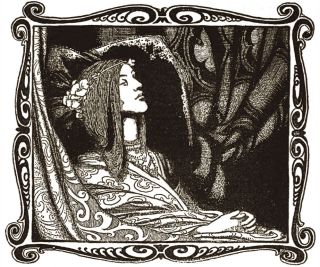Alcoholism
The Troubled Life of Edgar Allan Poe
How he came to exemplify the brilliant but troubled writer.
Updated August 14, 2023 Reviewed by Devon Frye
Key points
- Poe was the first American to earn the sobrioquet of the brilliant, but troubled and alcoholic, writer.
- Major themes in his early life included death and loss and an unrequited need for respect from his stepfather.
- He had a significant family history of alcoholism, in both his father and older brother.
- His excessive drinking began in college and took an ever-increasing toll after his mid-20s.
Previous articles in this blog have described the tortured lives of remarkably creative and accomplished figures, including Herman Melville, Charles Darwin, and Abraham Lincoln, and touched on the possible interaction of mental illness and their remarkable achievements. The discussion of Herman Melville, for instance, centered on the role of possible bipolar illness on his worldview, his periods of seemingly boundless energy, and his imagery.
It is fitting, then, to also consider the role of substance abuse in the lives of creative figures. A particularly appropriate person is Edgar Allan Poe, poet, short story writer, and creator of both the science fiction and detective genres, who exemplified the image of the alcoholic writer.1 This first article in this two-part series will provide the background of the story of his life; the second part will explore his addiction to alcohol and possibly other substances.

Born in Boston in 1809, Edgar Poe was the son of actors David Poe and Elizabeth Arnold Hopkins Poe. His father, the son of an Irish immigrant who had been an officer in the Revolutionary War, was an actor of limited talent who was very fond of the bottle and deserted his family when Edgar was one year old. His mother succumbed to tuberculosis at age 21, a year later.
The Poe children were dispersed, and Edgar went to live with her mother’s friend, Mrs. John Allan in Richmond, Virginia. Mrs. Allan, with no children of her own, lavished attention on him; her husband, a prosperous tobacco merchant, was a difficult man who withheld the praise Edgar sought from him.
The family added "Allan" to his name but he was never legally adopted. When he was six, they moved to England for five years, during which Edgar studied at a succession of boarding schools but felt isolated and never fit in very well.
The family returned to Richmond and prospered due to an inheritance coming to John Allan. These were better years for Edgar, who was known to be pleasant and was often asked to recite poetry.
During this time he became infatuated with a friend’s mother, whom he idealized. She died when he was 15, and brokenhearted, he visited her grave regularly. In some ways, his experience was similar to that of Emily Dickinson, who at age 14 lost her cousin, to whom she was very attached, marking the beginning of the theme of bereavement in many of her writings, and accentuated later when other important figures in her life passed away.
It has been speculated that both Poe’s mother’s death and this formative experience may have been the beginning of the motif of lovely young women who die early, with a love that persists beyond the grave. His grief, however, did not prevent him from meeting, and later proposing to another young lady, Sarah Elmira Royster.
In 1826 Poe enrolled in the University of Virginia, which was then in its second year after having been founded by Thomas Jefferson. Though his skill at poetry and painting was recognized, he also earned the reputation of a reckless gambler and heavy drinker. It was said that he drank his whiskey straight and copiously but without seeming to take pleasure in it. In less than a year his debts were so great that his stepfather paid them off but would not let him go back to the university.
Poe’s return to Richmond was, not surprisingly, an unhappy one, made worse by the news that Ms. Royster had married someone else. He moved to Boston where he worked part-time as a newspaper writer. But financial pressures led him to join the army in May of 1827 using a false name and saying that he was 22 instead of 18.
He was first stationed in Boston, where he published his first book, the poetry collection Tamerlane and Other Poems, which met with no success. Later he was transferred to Charleston, where he was assigned to assemble artillery shells. He did well, rising to the non-commissioned rank of sergeant major, but he tired of it.
He appealed once again to his stepfather, who was, however, occupied with the illness of his wife. After her death in February 1829, he reluctantly paid the fees necessary for Poe to leave before his enlistment was over, in the hopes that he would later attend West Point, to which his stepfather had used his influence to obtain an appointment.
After his discharge, Poe went to Baltimore, where he moved into the home of his 39-year-old aunt Maria Clemm, who would become a mother figure to him, as well as her daughter Virginia, later to become his wife, and his older brother Henry. During this time he published another book of poetry, again without notable success.
In July of 1830, he entered West Point, in perhaps his last attempt to please his stepfather. In his seven months there he became known for his fondness of brandy, and was admired by the other cadets for his satirical poems about their superiors.
Once again, though, Poe tired of his occupation, but his stepfather, to whom he was now estranged, would not pay the fees necessary for his release. In response, Poe refused to go to classes or church or to carry out other orders. As was his intent, he was court-martialed, and dismissed from the service.
In 1831 he returned to Maria Clemm’s home in Baltimore. Not long afterward Henry died, apparently of tuberculosis but complicated by debilitation from alcoholism. While mourning the loss of yet one more important figure in his life, Poe began writing short stories to help pay the family’s expenses and subsidize his poetry.
Though most paid little, he achieved some success with "MS. Found in a Bottle" in 1833. It led to him landing a job at the Southern Literary Messenger, first as a part-time contributor, then as a regular writer and book reviewer, and later as its editor.
In 1836 he persuaded his young cousin Virginia, then 13, to marry, though there is disagreement as to whether this was ever consummated. (There is some question as to whether Poe ever had a sexual relationship in his life.2) Maria Clemm continued to live with them, caring for the house then and even after Virginia’s death from tuberculosis at age 24 in 1847.
At first, he was a diligent husband and at least initially was not drinking. He became known for the vigor with which his reviews denounced the works of the literary stars of his day. But somewhere along the line, he returned to the bottle. It led to his being fired from his first major literary job, the first of many which would end this way.
The second article in this two-part series will describe the ever-increasing toll which Poe paid for his addiction, leading to his death in a delirious state at age 40, as well as his own thoughts about his drinking, and the possibility that his symptoms may have resulted not only from alcohol, but also from other substances.
Portions of this article are adapted from Fragile Brilliance: The Troubled Lives of Herman Melville, Edgar Allan Poe, Emily Dickinson and Other Great Authors.
References
1. Goodwin, D.W.: Alcohol and the Writer, Andrews & McMeel, New York, 1988.
2. Baab-Muguira, C.: Is this why Edgar Allan Poe never had kids? The Millions. Feb. 25, 2022.
https://themillions.com/2022/02/is-this-why-edgar-allan-poe-never-had-kids.html




